
-
Featured products
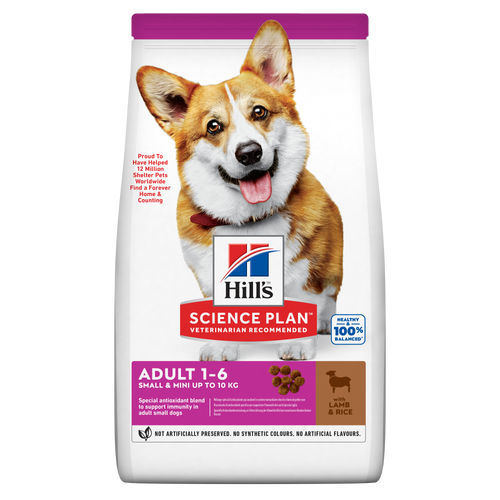 Small & Mini Adult Dog Food
Small & Mini Adult Dog FoodHill's Science Plan Small & Mini Breed Adult Dog Food with Lamb & Rice is a complete pet food, specially formulated with ActivBiome+ Multi-Benefit Technology.
Tailored nutrition for the unique needs of small dogs during the prime of their life.Shop Now Small & Mini Mature Adult Dog Food
Small & Mini Mature Adult Dog FoodHill's Science Plan Small & Mini Breed Mature Adult Dog Food with Chicken is a complete pet food, specially formulated with ActivBiome+ Multi-Benefit Technology.
Tailored nutrition to support graceful ageing in small dogs. Specially made with a synergistic blend of nutrients for energy & vigor.Shop Now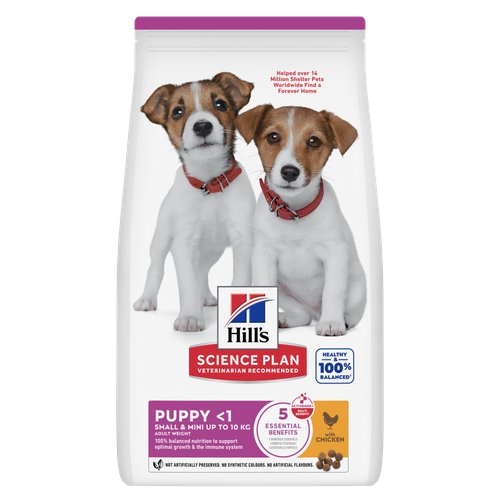 Small & Mini Puppy Food
Small & Mini Puppy FoodHill's Science Plan Puppy Small & Mini Breed Dog Food with Chicken is a complete pet food, specially formulated with ActivBiome+ Multi-Benefit Technology.
100% balanced nutrition to support optimal growth & the immune system.Shop NowFeatured products Oral Care Adult Cat Food
Oral Care Adult Cat FoodHill's Science Plan Oral Care Adult Cat Food with Chicken contains clinically proven kibble technology to reduce plaque & tartar build up.
Shop Now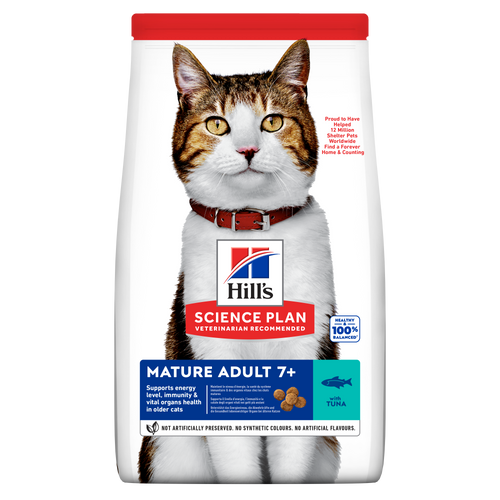 Mature Adult 7+ Cat Food
Mature Adult 7+ Cat FoodHill's Science Plan Mature Adult Cat Food with Salmon is a complete pet food, specially formulated with ActivBiome+ Multi-Benefit Technology.
This food supports graceful aging in cats, providing a synergistic ingredient blend to help support energy & activity levels.Shop Now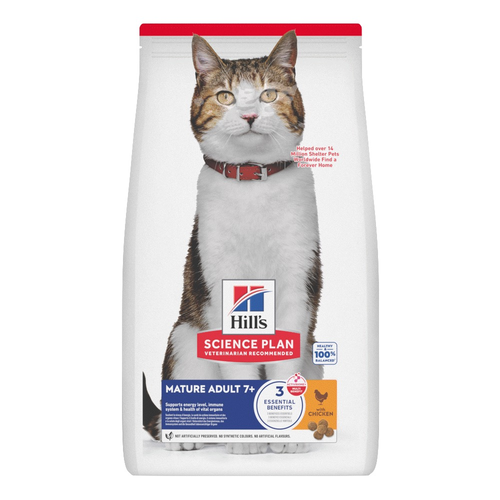 Mature Adult Cat Food
Mature Adult Cat FoodHill's Science Plan Mature Adult Cat Food with Chicken is a complete pet food, specially formulated with ActivBiome+ Multi-Benefit Technology.
This food supports graceful aging in cats, providing a synergistic ingredient blend to help support energy & activity levels.Shop Now -
Dog
- Dog Tips & Articles
-
Health Category
- Weight
- Food & Environmental Sensitivities
- Urinary
- Digestive
- Joint
- Kidney
Featured articles The Incredible Science Behind Your Pet's Microbiome
The Incredible Science Behind Your Pet's MicrobiomeLearn what your pet's microbiome is, how it contributes to your pet's gut and overall health, and why nutrition is important in maintaining healthy microbiomes.
Read More Proteins
ProteinsTo make a protein, amino acids are linked together in a long chain. The chain is then bundled into to a three-dimensional structure, like a tangled ball of yarn.
Read More The Right Diet For Your Pet
The Right Diet For Your PetIn people, the right diet is very important. If you are eating the wrong way for your metabolism, activity level, age and lifestyle you could end up with health issues.
Read More -


Stay Healthy During the Golden Years
Great news for cat parents: Our cats are living longer than ever before. Just like people, cats have changing needs as they age. Here are some simple things you can do to help your senior cat stay healthy, happy, and vital.

When is my Cat a Senior?
While every cat is different, there are general guidelines to determine when they become "senior citizens." Cats are considered mature at seven to 10 years; senior at 11 to 14 years; and geriatric at 15 or older. Ultimately your cat’s genetics, nutrition and environment will all play a role in determining when they are a senior.
Make the Veterinarian Your First Stop
Regular check-ups are essential to your cat’s health, and become even more important as your cat ages. Age-related diseases can be subtle, and symptoms may be easy to miss. Through regular exams and blood tests, your veterinarian can establish a baseline of what is normal for your cat. This will help alert you when something is not right. If you notice any changes in your cat’s behaviour, appetite or energy level, be sure to check with your veterinarian. (Ed. note: Senior cats are advised to see a veterinarian every six months.)


Tasty Tips
Choose the Right Cat Food
Older cats that are less active need fewer calories. Try limiting portion sizes at mealtime. Obesity contributes to many diseases and puts more stress on your cat’s joints. There are special cat foods to improve issues with joint disease or mobility. Cats with kidney or heart disease may also need special nutrition. Your veterinarian can design a weight plan that addresses your cat’s specific nutritional needs and recommend if supplementation or specialised cat food will help. Come prepared with a list of questions to ask your veterinarian.


One of our staff authors prepared this article for you
Related products

Hill's Science Plan Mature Adult Cat Food with Salmon is a complete pet food, specially formulated with ActivBiome+ Multi-Benefit Technology.
This food supports graceful aging in cats, providing a synergistic ingredient blend to help support energy & activity levels.

Hill's Science Plan Mature Adult Cat Food with Chicken is a complete pet food, specially formulated with ActivBiome+ Multi-Benefit Technology.
This food supports graceful aging in cats, providing a synergistic ingredient blend to help support energy & activity levels.

Hill's Science Plan Oral Care Adult Cat Food with Chicken contains clinically proven kibble technology to reduce plaque & tartar build up.
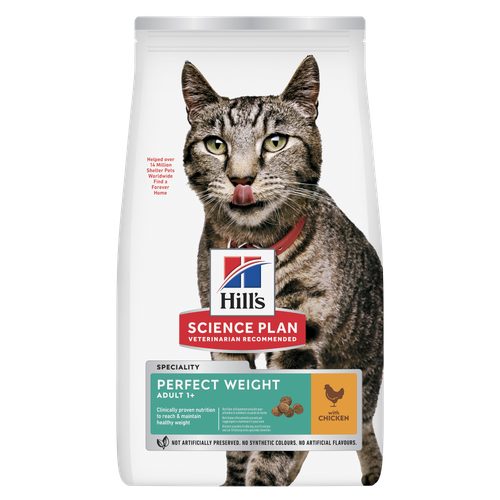
Hill's Science Plan Perfect Weight Adult Cat Food with Chicken is clinically proven nutrition to reach & maintain healthy weight.
Related articles

Find the right Hill

Good nutrition is about the right balance of nutrients. Learn more about health issues when feeding a cat food that has an improper nutritional balance from your friends at Hills Pet Nutrition.

When learning how to train your cat, you'll start with very basic first steps that both reward good behavior and discourage the bad.

HillsPet Nutrition provides information on proper nutrition, fitness and special needs in keeping your cat healthy and happy.

Put your cat on a diet without them knowing
Our low calorie formula helps you control your cat's weight. It's packed with high-quality protein for building lean muscles, and made with purposeful ingredients for a flavorful, nutritious meal. Clinically proven antioxidants, Vitamin C+E, help promote a healthy immune system.
Put your cat on a diet without them knowing
Our low calorie formula helps you control your cat's weight. It's packed with high-quality protein for building lean muscles, and made with purposeful ingredients for a flavorful, nutritious meal. Clinically proven antioxidants, Vitamin C+E, help promote a healthy immune system.

